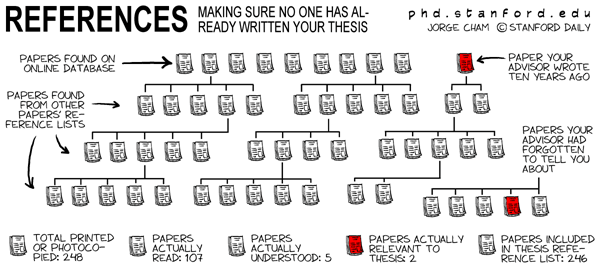 "Piled Higher and Deeper" by Jorge Cham
"Piled Higher and Deeper" by Jorge Chamwww.phdcomics.com
Doctoral dissertations and theses are fantastic sources for research in many disciplines, incredibly useful in large part for their extensive bibliographies on a given topic. Duke Libraries offers several modes of access to online and print dissertations from Duke and other universities; a sampling is below.
DukeSpace electronic theses and dissertations
Has its roots in University Archives, contains full text of many Duke dissertations written from 2007-, plus some theses and University archival material.
Dissertations at Duke University
This interface is from Proquest; no masters papers included. Includes doctoral dissertations by Duke University users. View 24-page previews of Duke doctoral dissertations from 1996 forward, with a growing number available dating from 1995 and earlier. Download the full text of all Duke dissertations available within the database.
Dissertations and Theses: Full Text
Also from Proquest, includes more than 2.4 million entries for dissertations and theses in all subject areas from around the world. Provides abstracts for dissertations (July 1980-present); abstracts for master's theses (1988-present); and citations for dissertations dating from 1637. Offers 24-page previews of recent dissertations and theses available from the UMI vaults on microfilm or in hardcopy. Nearly one million dissertations and theses are available for download in PDF format, with some 2000 new PDFs being added to the database each week.
Dissertations and Theses. UK and Ireland
Proquest again! A comprehensive bibliographic listing of dissertations and theses, most with abstracts, accepted for higher degrees by universities in the United Kingdom and Ireland. Date range: 1716 to current. May be searched or browsed by subject or by location.
CRL Foreign Doctoral Dissertations
The Center for Research Libraries acquires and preserves newspapers, journals, documents, archives, and other traditional and digital resources for research and teaching, including dissertations. This collection includes the early thought of some major figures in 20th-Century intellectual life, including Albert Schweitzer, Dag Hammarskjold, Albert Einstein and scores of other Nobel prize winners.




